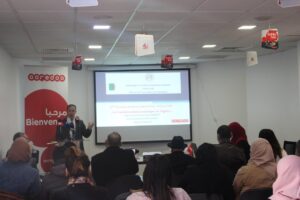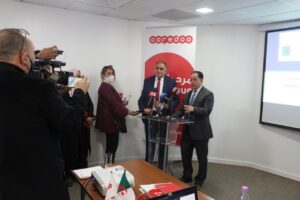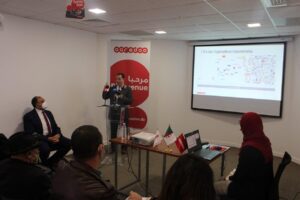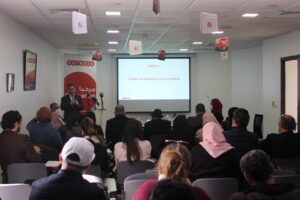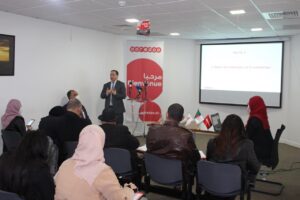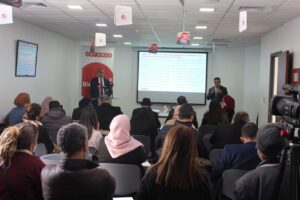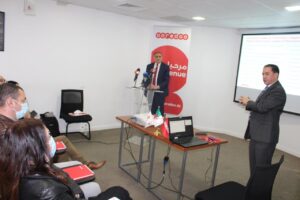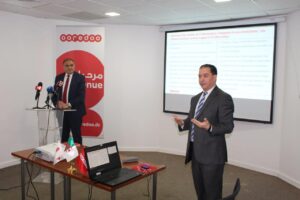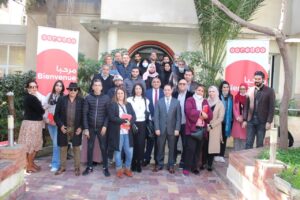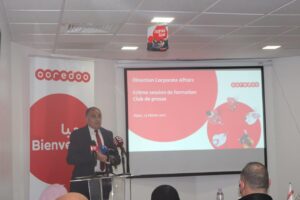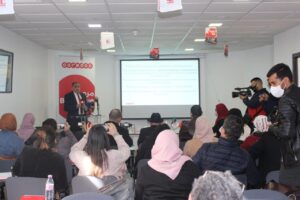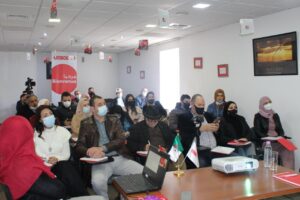After an interruption of more than two years due to the health crisis, Ooredoo resumes the activities of its Press Club and its training for the benefit of journalists and media professionals, by organizing this Wednesday, February 23, 2022, the 67th session in the premises. of its Sales School located in Hydra in Algiers.
Organized in collaboration with the Ministry of Digitization and Statistics, this training session under the theme: “Digital transformation in Algeria” was provided by Mr. Hacene Derrar, Director General of Digitization within the Ministry of Digitization and statistics.
At the opening of this 67th training session, Mr. Ramdane Djezairi, Director of Corporate Affairs at Ooredoo, presented a retrospective of the activities of the Ooredoo Press Club, which was created in 2006, while recalling the diversified themes covered during the 66 training sessions provided so far, including around eight for the benefit of correspondent journalists in the regions. He also announced the imminent launch of the 15th edition of the “Media Star” journalistic competition.
In the first part of the training, Mr. Derrar gave an overview of the digital transformation in the world, which corresponds to the 4th industrial revolution or Industry 4.0 which began in the early 2000s.
Supporting his remarks with statistics for the month of January 2022, the trainer indicated that the number of unique mobile phone users reached 5.31 billion, that of Internet users 4.95 billion and the number of active users on social media crossed the 4.62 billion mark. Figures that show the growth, year on year, in the number of digital technology users in the world, with +4% (+192 million) for the Internet, +1.8% (+95 million) for the mobile phone and +10.1% (+424 million) for social networks.
This growing interest in the Internet and digital technology has given rise to majors that achieve annual turnover of several billion dollars, notably GAFA (Google, Apple, Facebook and Amazon) and NATU (Netflix, Airbnb, Tesla). , and Uber).
In the second part, the trainer will discuss the history of ICT and digital transformation in Algeria, which began after independence, with the creation of the National Computer Commission (CNI), then the creation, in the 1980s, of the National Company of Computer Systems (ENSI) restructured in 1990 into an independent company providing computer services and engineering, responsible for supporting the computerization of public institutions. The 2000s were marked by the creation of the Post and Telecommunications Regulatory Authority (ARPT, now ARPCE), the launch of major structuring projects, in particular e-Algeria 2013, which advocates a coherent and vigorous, aimed at strengthening the performance of the national economy, businesses and the administration.
A strengthened administration in 2016, with the creation of a post of Minister Delegate in charge of the Digital Economy and the Modernization of Financial Systems, then in 2017 with the restructuring of the MPTIC into the Ministry of Post, Telecommunications, Technologies and Digital and finally in 2020 the creation of the Ministry of Digitization and Statistics.
Referring to the key digitization figures in Algeria, Mr. Derrar indicated that Algeria has 46.5 million mobile phone users (i.e. 103.5% of the population), 27.8 million users of Internet (60.8% of the population) and 26.6 million social network users (59.1%).
In order to support this transformation, the Ministry of Digitization and Statistics has put in place a roadmap which, in its digitization component, aims as a priority as a major objective, the digital transformation of public administration and the economic sector and the acceleration of the country’s digital transition.
According to Mr. Derrar, for the realization of the objectives of the national digital strategy, the said ministerial department has identified four priority areas, namely:
1. Pursuing actions to establish an environment to support digital transformation in terms of: regulatory, organizational, financial and technological.
2. The development of e-Governance and the acceleration of the digitization of the administration for better public governance;
3. The establishment of an ecosystem favorable to the development of the digital economy;
4. Encourage digital citizenship conducive to the emergence of a digital culture that guarantees public action and civic and supportive citizenship.
In his 3rd part, the trainer addressed the impact of digital technology on the profession of journalism, which has undergone multidimensional changes that relate to both structural and cyclical factors.
“Digital technology has revolutionized both the way people get information and the financing of information. Facebook, Google have become the main sources of information research and traffic to news sites. Social networks, Twitter in particular, have become essential and inexhaustible tools for information and scoops for journalists” maintains Mr. Derrar for whom “social networks allow journalists and editors to immediately assess the impact of an actuality. They become warning signs to assess what interests public opinion or not. »
Also, journalism 2.0. has enabled the emergence of new professions and new opportunities: e-community manager, multimedia content producer, data journalist, blogger, web editor, etc.
According to Mr. Derrar “digital changes and technological developments do not call for the disappearance of journalism, on the contrary, we have never needed so much to be accompanied intelligently in understanding a world in rapid change. »
“Sorting, checking, prioritizing, putting into perspective and analyzing are valuable skills in an environment where readers need more than ever to filter and digest the mass of information that reaches them to avoid “fake news” and preserve the credibility of the media” insists the trainer.
At the end of the training, a rich debate was initiated between the journalists and the trainer around the theme of the session.
Trainer Biography: Hacene Derrar, Director General of Digitization within the Ministry of Digitization and Statistics
Director General of Digitization at the Ministry of Digitization and Statistics. Holder of a doctorate in artificial intelligence and advanced databases, from the USTHB in joint supervision with the University Lumière Lyon 2 (France). He also holds an MBA in Management and Business Strategy from Wersford-Geneva University (Switzerland). His skills are oriented more particularly in digital transformation strategies and in decision support systems.
